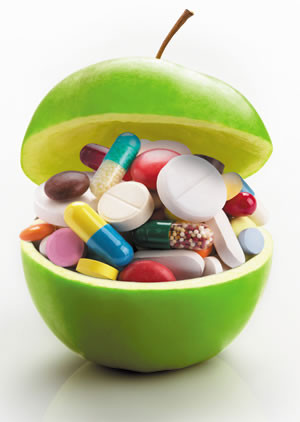
5 timeless habits for better health

What are the symptoms of prostate cancer?

Is your breakfast cereal healthy?

When pain signals an emergency: Symptoms you should never ignore

Does exercise give you energy?

Acupuncture for pain relief: How it works and what to expect

How to avoid jet lag: Tips for staying alert when you travel

Biofeedback therapy: How it works and how it can help relieve pain

Best vitamins and minerals for energy

Should you take probiotics with antibiotics?
Heart Health Archive
Articles
How serious is bundle branch block?
Ask the doctor
Q. A recent electrocardiogram showed that I have a right bundle branch block. My doctor says it's fairly common and nothing to worry about, but I'm a bit concerned. What is it, exactly? And what specifically can cause this problem?
A. Bundle branch block refers to a small glitch in the heart's electrical conduction system. The term "bundle" refers to a collection of nerve fibers that receive the "contract now" signal from the atrioventricular node and relay it to the ventricles, the heart's lower chambers (see illustration).
Exergaming: Fitness and fun in front of your TV?
Active-play video games may encourage adults — including those with heart disease — to be more active.
Looking to liven up your indoor exercise routine? You might want to try exergaming — a fitness trend that incorporates exercise into a video game. Also called gamercising, the workouts may be more motivating and fun than a traditional exercise video.
"One advantage to exergaming is that the game choices are so broad, you can tailor the exercise to your own particular interest," says Dr. Ashwin Babu, a sports medicine physiatrist at Harvard-affiliated Massachusetts General Hospital. Depending on the video gaming system, you can choose from a wide array of simulated sports and recreational activities, including baseball, bowling, boxing, cycling, football, golf, table tennis, track and field events, skateboarding, skiing, tennis, and volleyball. Some offer muscle-strengthening workouts, balance and stretching, aerobic exercises, dancing, and martial arts. Others feature adventure games that you "play" with your body movements, such as moving your arms, jumping, squatting, running in place, and sidestepping.
Updated advice for people with both diabetes and heart disease
The latest recommendations focus on newer medications, lifestyle changes, and procedures.
If you have heart disease, following a healthy diet and getting regular exercise should be a top priority. Both habits can help you reach and stay at a healthy weight and lower your blood pressure and cholesterol level. Chances are you'll also need to take medications to further improve those common heart-related risk factors. But if you also have diabetes, you may need even more aggressive treatment, according to new advice from the American Heart Association.
The recommendations, published May 12, 2020, in the journal Circulation, detail the latest evidence about treatments for people with both heart disease and diabetes. Diabetes, which affects about one in 10 adults, doubles the odds of having a heart attack or stroke (see "Why is diabetes hard on your heart?").
Can high-tech heart scans help prevent heart attacks?
Cardiac CT angiography is gaining ground as a fast, effective way to diagnose coronary artery disease.
If you experience a short-lived squeezing sensation or discomfort in your chest when you exercise or feel stressed, one possible cause is inadequate blood flow to the heart. Known as stable angina, this condition suggests you have heart disease and may be at risk for a heart attack.
Doctors can use a number of different tests to diagnose (or rule out) inadequate blood flow to the heart muscle. The first step is frequently a type of stress test, which checks the heart's electrical activity, muscle function, or blood flow patterns while the heart is under stress from exercise or medication. Stress tests can identify areas of reduced blood flow, which suggest a narrowing in the artery that supplies that part of the heart.
Grain of the month: Barley
You may be familiar with the claims featured on packages of old-fashioned oatmeal, which note that "As part of a heart-healthy diet, the soluble fiber in oatmeal can help reduce cholesterol." Guess what? Back in 2008, the FDA also approved the equivalent health claim for barley products.
In fact, barley contains about three times as much fiber per serving as oats. Barley is particularly rich in a type of soluble fiber known as beta glucan, which is recognized for its cholesterol-lowering abilities. Barley is also a good or excellent source of several vitamins and minerals.
Lifestyle changes are important for managing atrial fibrillation
Many lifestyle factors can influence the development of atrial fibrillation, and doctors now better understand the importance of these factors in treating afib. Those who are at risk of developing afib can take action to improve their health, and in some cases they may be able to reduce their symptoms.
Pain relief that's safe for your heart
Some common painkillers may boost the odds of a heart problem. Use them wisely to lessen your risk.
In 2004, the drug maker Merck pulled rofecoxib (Vioxx) off the market, following revelations that the popular prescription painkiller increased the risk of heart attacks and strokes. That action triggered a closer look at drugs in the same class, known as nonsteroidal anti-inflammatory drugs (NSAIDs). These drugs, which are widely used to ease pain, quell inflammation, and cool fevers, include over-the-counter drugs such as aspirin, ibuprofen (Advil, Motrin), naproxen (Aleve, Naprosyn) and the prescription drug celecoxib (Celebrex).
Dietary supplements: Sorting out the science
Image: Nomadsoul1/Getty Images |
A few supplements show limited, possible benefits for people with heart disease. But some popular ones don't—and others may be dangerous.
Depression and heart disease: A two-way street
Watch for the warning signs of depression, which is often missed in people with heart disease.
Image: gpointstudio/Thinkstock
All people have days when they feel sad, gloomy, or down in the dumps. But if those feelings last for weeks and you gradually stop feeling hopeful or happy about anything in your life, you may have depression. Like heart disease, depression is common, so it's not unusual to have both conditions together. In fact, depression is about twice as likely to occur in people with heart disease compared with the general population. And people with depression face a heightened risk of heart disease.
"It's really important for people to be aware of this link and to get treatment for depression, because it can be very debilitating," says Dr. Christopher Celano, a psychiatrist at the Cardiac Psychiatry Research Program at Harvard-affiliated Massachusetts General Hospital.
Avoiding atrial fibrillation
How maintaining a healthy weight and other lifestyle habits can help prevent this common heart rhythm disorder.
During a bout of atrial fibrillation, your heart may beat so rapidly, it may feel as though it's going to explode out of your chest. Commonly known as afib, this heart rhythm problem can leave you breathless and lightheaded—or cause no symptoms at all. About 9% of people ages 65 and older have afib, which raises the risk of stroke and other heart-related problems. But there are ways to lower your odds of developing afib—or to reduce its impact if you already have the condition.
Lessen your load
By far, the most important step you can take is to attain and stay at a healthy weight. "We have good evidence from multiple studies showing that people who are overweight have a higher risk of afib than people who are at a healthy weight," says Harvard professor of medicine Dr. Christine Albert, former director of the Center for Arrhythmia Prevention at Brigham and Women's Hospital. And the more you weigh, the higher your risk: people who are overweight have a 20% to 25% higher risk, whereas those who are obese (a body mass index, or BMI, of 30 or higher) have a 60% higher risk.

5 timeless habits for better health

What are the symptoms of prostate cancer?

Is your breakfast cereal healthy?

When pain signals an emergency: Symptoms you should never ignore

Does exercise give you energy?

Acupuncture for pain relief: How it works and what to expect

How to avoid jet lag: Tips for staying alert when you travel

Biofeedback therapy: How it works and how it can help relieve pain

Best vitamins and minerals for energy

Should you take probiotics with antibiotics?
Free Healthbeat Signup
Get the latest in health news delivered to your inbox!
Sign Up











